What to eat when you're constipated
Backed up? You may be able to find relief by switching up your diet.
Updated on October 29, 2024

If you've ever struggled to use the bathroom, you're not alone.
Constipation is a common gastrointestinal problem that involves having fewer than three bowel movements a week. Chronic constipation is infrequent bowel movements or difficulty passing stool that lasts for several weeks. It affects up to 20 percent of adults in the United Sates. In some cases, both chronic and acute constipation can be treated with medication to soften stool (poop).
Some diet tweaks can also help move things along. Certain foods, especially those high in fiber and water, may help ease constipation.
With that in mind, here are reasons you might be constipated, plus foods that can help you (finally) go to the bathroom.
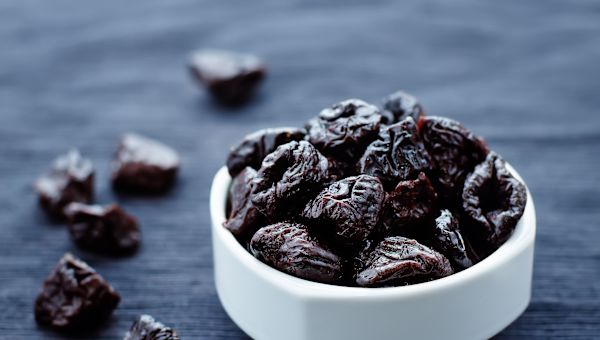
Prunes
Prunes are dried plums. They contain about 6 grams of dietary fiber per 1/2 cup. Our bodies rely on fiber for healthy bowel movements. Experts recommend women consume between 22 and 28 grams of dietary fiber each day, depending on age. Pregnant people may need more, based on trimester. Men should have between 28 and 34 grams daily, also dependent on their age.
There are other properties that make prunes exceptional for relieving constipation. Fructose and sorbitol are sugars and sugar alcohols found in the fruit. They often produce a laxative-like effect on digestion, making it a bit easier to go.
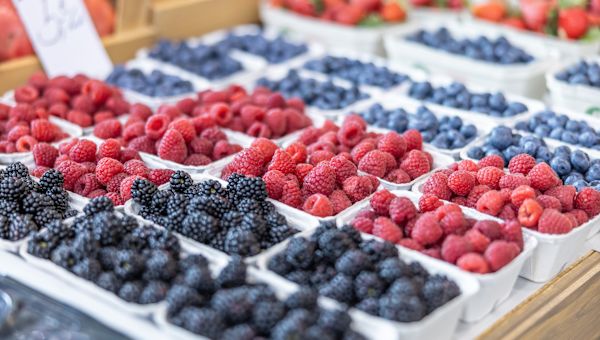
Berries
Berries can also help ease constipation. Why? One cup of raspberries contains 8 grams of dietary fiber.
Berries are hydrating, too. Strawberries are made up of about 91 percent water. In addition to helping regulate body temperature, lubricating joints, and protecting the spinal cord, adequate hydration helps food pass through the intestines, reducing the risk of constipation.
Berries aren't the only hydrating foods. "Things like cucumber and celery have a lot of moisture,” says Robin Foroutan, MS, RDN, an integrative registered dietitian in Garden City, New York.
Still, drinking fluids is the most efficient way to stay hydrated. The amount of water you need varies from person to person. For most people, the best advice is simply to drink when you’re thirsty. People with certain medical conditions or who take some medications may need to watch their intake, so check with your healthcare provider (HCP) about the right amount for you. Get a head start on hydration by adding berries and other water-rich foods to your diet.
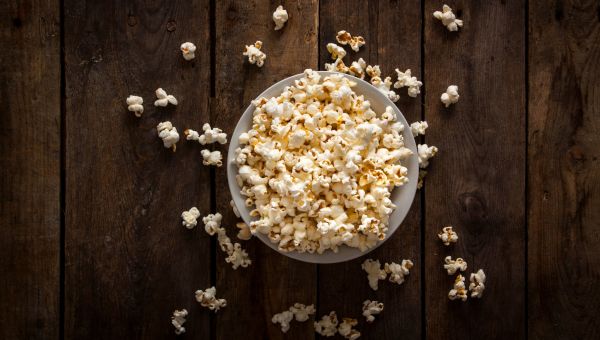
Air-popped popcorn
Since air-popped popcorn is a whole grain and high in fiber, it can help your bowels get moving. Plus, like other whole grains, popcorn contains potassium and magnesium, two minerals that help maintain bone and muscle health and regulate fluids in the body.
"Magnesium is really important for muscle conductivity, and if we think of our digestive tract as a big, long muscle that moves, we can understand magnesium is a really important nutrient," Foroutan says.
Just remember to limit the amount of butter and salt you add to your popcorn. For one thing, too much butter can actually contribute to constipation. And in excess, neither are good for heart health.
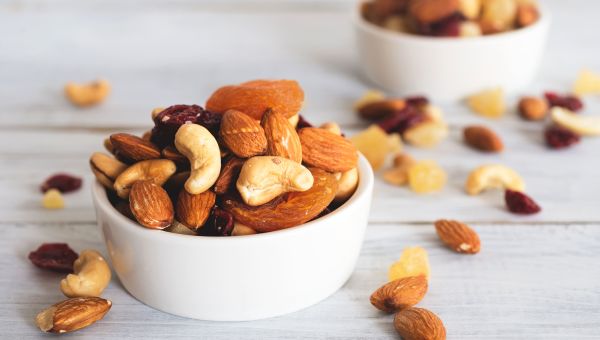
Nuts
Nuts like walnuts and almonds contain healthy fat, protein, and fiber. One ounce of walnuts, about 14 halves, contains around 2 grams of fiber. The same serving of almonds, about 23 nuts, contains about 3.5 grams.
Although nuts are beneficial, they're also dense with calories, so limit yourself to about 1 ounce each day. Try topping your lunchtime salad with chopped walnuts or eat a fistful of crunchy almonds as a snack.

Oatmeal
Oats, another whole grain, are known for their versatility and ability to fill you up. Per dry cup, oats contain 8 grams of fiber, about half of which is soluble. Soluble fiber helps stool pass more easily. A 1-cup serving of oats also packs more than 100 percent of the daily recommended amount of manganese, a mineral that helps keep your brain, nerves, blood, and bones healthy.
If you're feeling backed up, stir up a warm bowl of oats and top with other digestion-friendly foods, like fresh fruit or chopped nuts.
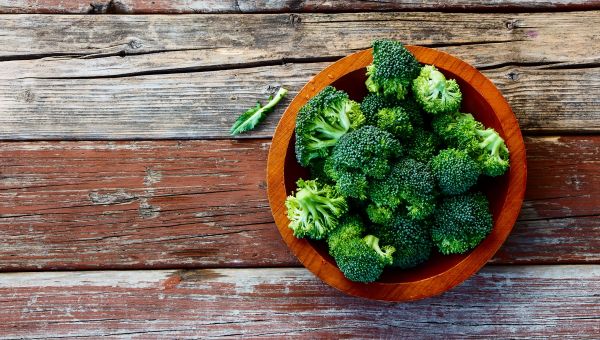
Broccoli
These crunchy florets are helpful in relieving constipation for a number of reasons. One chopped cup contains more than 2 grams of fiber and is made up of about 90 percent water. It also contains 19 milligrams of magnesium, an essential nutrient for digestion.
Enjoy a side of steamed or baked broccoli with your evening meal. Or, if you're looking for a healthy snack, try dipping a few florets in a serving of hummus, a chickpea spread with its own benefits. Hummus contains about 1 gram of fiber per tablespoon, so it may also be helpful for relieving constipation.
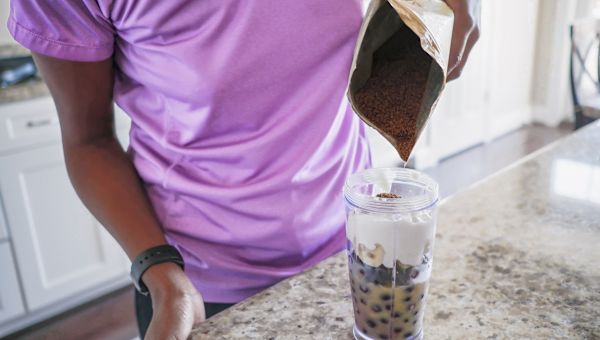
Flaxseed
Flaxseed comes from the flax plant, an herb used in ancient times as both food and medicine. Flaxseed is available in a number of different forms—including ground, whole seeds, and oil—and is a good source of omega-3 fatty acids, which may help protect the heart from disease.
That's not all. Flaxseed contains a good amount of fiber, 2 grams per ground tablespoon, which helps promote healthy digestion. These seeds also contain mucilage, a gummy substance that, along with fiber, helps add bulk to stool.
These seeds were used as laxatives in decades past. Today, they can help relieve constipation, and they're simple to incorporate into your diet. Sprinkle a spoonful on your afternoon salad, morning oats or blend in your next smoothie.
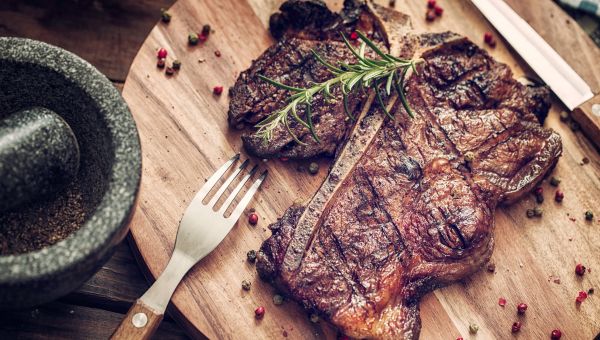
What not to eat
If you want to have regular, healthy bowel movements, it’s wise to limit low-fiber foods like red meats and dairy products. You might also want to steer clear of processed foods like white bread and pastas, French fries, pastries, and chips—which may make constipation worse.
Aside from diet, Foroutan says that dehydration, stress, and inactivity can also contribute to constipation.
A healthy diet full of whole foods—think fruits, veggies and whole grains—is beneficial for digestion and may help with constipation. However, if it's been three or more days since your last bowel movement, you feel bloated, nauseated, or have blood in your stool, contact an HCP. They can diagnose your issue and are best able to prescribe a course of treatment that may include laxatives or a special diet. If constipation is a new problem for you, see an HCP to be sure there are no medical issues behind it.
National Institute of Diabetes and Digestive and Kidney Issues. Definition & Facts for Constipation. Reviewed May 2018.
Oh SJ, Fuller G, Patel D, Khalil C, et al. Chronic Constipation in the United States: Results From a Population-Based Survey Assessing Healthcare Seeking and Use of Pharmacotherapy. Am J Gastroenterol. 2020 Jun;115(6):895-905.
MedlinePlus. Stool softener. Revised June 20, 2024.
MedlinePlus. Fiber. Reviewed July 25, 2022.
USDA. Dietary Guidelines for Americans 2020-2025. December 2020.
Bae SH. Diets for constipation. Pediatr Gastroenterol Hepatol Nutr. 2014 Dec;17(4):203-8.
Kaiser Permanente. Are Prunes Good for Constipation? January 5, 2024.
Michigan State University: MSU Extension Food & Health. Eating fruit to help stay hydrated. March 2, 2021.
FamilyDoctor.org (AAFP). Hydration: Why It’s So Important. Updated June 2023.
Mayo Clinic. Water: How much should you drink every day? October 12, 2022.
Centers for Disease Control and Prevention. Fast Facts: Data on Water Consumption. January 19, 2024.
NIH: Office of Dietary Supplements. Potassium. Updated March 22, 2021.
NIH: Office of Dietary Supplements. Magnesium. Updated March 22, 2021.
MedlinePlus. Magnesium in diet. Reviewed January 19, 2023.
Johns Hopkins Medicine. Foods for Constipation. Accessed October 29, 2024.
Cleveland Clinic. The Health Benefits of Nuts. January 17, 2023.
MedlinePlus. Soluble vs. insoluble fiber. Reviewed July 30, 2022.
NIH: Office of Dietary Supplements. Manganese. Updated March 22, 2021.
Mayo Clinic Health System. What makes tiny flaxseed a nutritional powerhouse? July 10, 2024.
Bladder & Bowel UK. What do we know about flaxseed and bowel health? July 28, 2022.
National Institute of Diabetes and Digestive and Kidney Issues. Eating, Diet, & Nutrition for Constipation. Reviewed May 2018.
Harvard Health Publishing. Common causes of constipation. July 18, 2023.
MedlinePlus. Constipation – self-care. July 25, 2022.
More On


video

article


video

article

article
